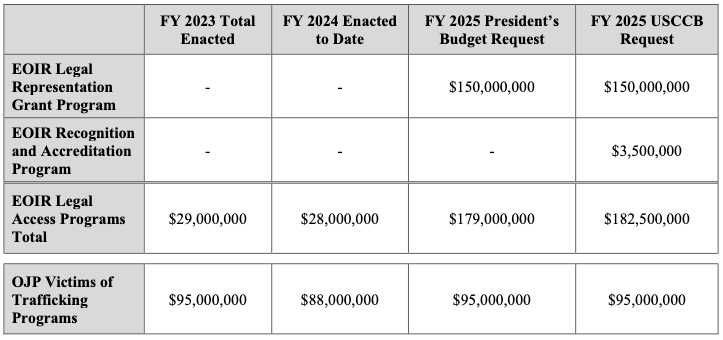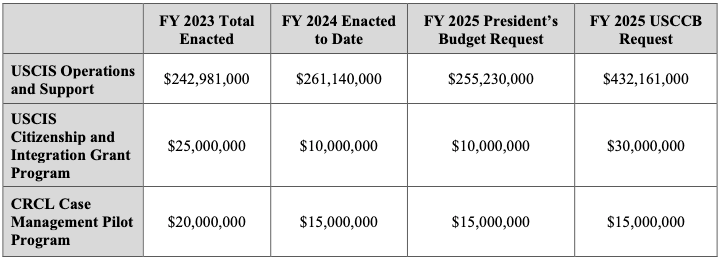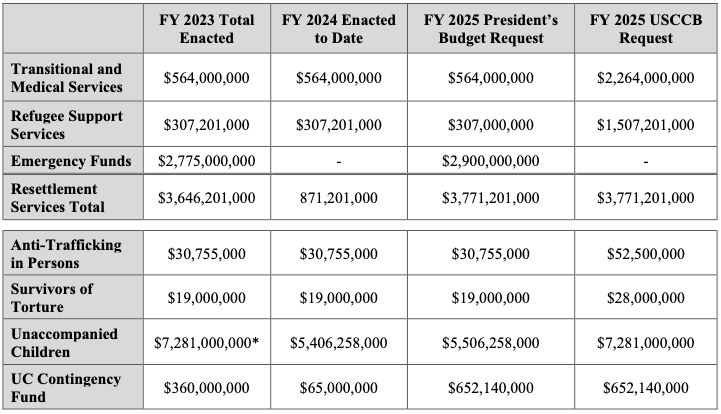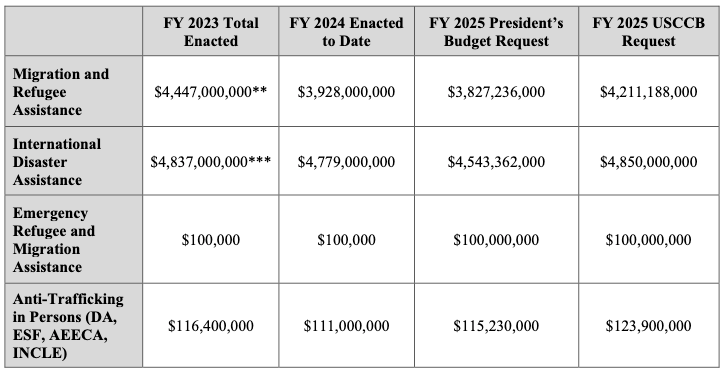General
Letter to Congress Regarding FY 2025 Migration-Related Funding Requests (April 25, 2024)
April 25, 2024
Dear Senator/Representative:
As Congress begins its work on Fiscal Year (FY) 2025 appropriations, several policy committees of the U.S. Conference of Catholic Bishops (USCCB) will be engaging lawmakers on appropriations matters under their purview, expressing views on funding that supports the poor, migrants and refugees, foreign assistance, environmental protection, access to healthcare, housing, and nutrition, and other programs that help individuals and families to live with dignity. Together, these views represent the wide breadth of concern of the bishops in the budget and appropriations process. Today, I write on behalf of the USCCB’s Committee on Migration to request your support for our funding priorities related to agencies and programs that are crucial for the wellbeing of immigrants, refugees, asylees, asylum seekers, unaccompanied migrant children, survivors of torture, victims of human trafficking, and others. We ask that you consider the following requests when developing your FY 2025 funding proposals. In addition, we continue to be concerned about certain FY 2024 supplemental funding needs not yet addressed by Congress.[1]
A. Commerce, Justice, Science, and Related Agencies (CJS)
The Executive Office for Immigration Review (EOIR) plays a vital role in the U.S. immigration system, and the agency is faced with a record number of cases—over 3.4 million currently in its backlog, over 1.1 million of which are asylum cases.[2] The Administration’s total request of $981 million for EOIR includes a proposal to add 25 new immigration judge teams, consistent with longstanding need and our recommendations over the last several years. We urge Congress to support an expansion of EOIR’s capacity in FY 2025 to better ensure timely adjudication of cases and facilitate due process for noncitizens in proceedings.
Legal Access Programs: In addition to EOIR’s backlog reduction efforts, we strongly support increased funding for Legal Access Programs, which includes the Legal Orientation Program, the Legal Orientation Program for Custodians of Unaccompanied Children, and the Recognition and Accreditation (R&A) Program. Collectively, these programs not only provide crucial legal information to those with immigration court cases but also help streamline proceedings, making them more efficient and cost-effective, as well as fair.[3] Of noncitizens whose cases were started between FY 2011 and FY 2019 and granted relief, almost 93% were represented, whereas only 18% of all those denied relief during that period were represented.[4] Thus, we also commend the Administration’s request of $150 million for a new grant program to facilitate access to legal representation and encourage Congress to support this initiative. We also strongly support increased funding for the implementation of specialized juvenile dockets within EOIR to improve proceedings for children.
Recognition and Accreditation (R&A) Program: EOIR’s R&A Program has operated since 1958 to increase the number of qualified immigration legal representatives available to serve low-income immigrants, especially where there is a shortage of immigration attorneys. This program has struggled in recent years to maintain sufficient personnel and resources to process new and renewal applications for recognition of organizations and accreditation of representatives. There have been significant backlogs, leaving applicants waiting more than a year for adjudication because the program is underfunded and understaffed.[5] The backlogs have only been reduced due to temporary reassignments; permanent resource allocation is necessary to support this essential program. Therefore, we ask that $3.5 million specifically be appropriated to EOIR for the purpose of increasing R&A staffing and improving the program’s operations.
Victims of Trafficking Programs: We affirm the Administration’s request of $95 million to support grants through the Office of Justice Programs that promote comprehensive and specialized services for human trafficking victims.
B. Department of Homeland Security (DHS)
The Catholic Church acknowledges the right of countries to maintain their borders and the responsibility of governments to protect the people within their borders, consistent with the common good. At the same time, we believe that right and responsibility should be exercised in a manner that is consistent with the moral obligation to protect the humanitarian needs of migrants and refugees. More prosperous nations have a greater obligation to accommodate those needs,[6] and they can do so in a manner that does not jeopardize the safety or wellbeing of their citizens. Whether in the context of appropriations or otherwise, we continue to urge Congress to reject measures that “further restrict access to asylum, curtail due process for noncitizens, and create authorities inconsistent with the United States’ obligations under international law. Such measures target the symptoms of underlying challenges through an ineffective deterrence-centered approach instead of addressing the challenges themselves.”[7]
United States Citizenship and Immigration Services (USCIS) Operations and Support: We appreciate the Administration’s FY 2025 request of $255 million in discretionary funding for USCIS Operations and Support. The increased humanitarian workload of the agency can no longer be supported by what has historically been a fee-funded operating model, and funding shortfalls have burdened the agency for several years.[8] Sharply increasing fees paid by employment- and family-based immigrants is not the solution.[9] Direct appropriations from Congress is necessary for a just, accessible, and functioning legal immigration system, as well as to facilitate refugee resettlement, asylum, and other humanitarian pathways, all of which depend in large part on an adequately staffed and modernized USCIS. Given the need, we ask that you appropriate at least $432 million, the Senate’s FY 2024 proposal.
Citizenship and Integration Grant Program: Pope Francis has reminded us that “immigrants, if they are helped to integrate, are a blessing, a source of enrichment and new gift that encourages a society to grow.”[10] Consistent with this reality, we urge Congress to fund the Citizenship and Integration Grant Program, especially toward the end of increasing the capacity of organizations to provide citizenship services to underserved communities.
Case Management Pilot Program (CMPP): We support an enforcement system that defaults to community-based alternatives to detention (ATD), particularly programs that leverage case management and direct service provision by qualified nonprofit organizations. While accounting for the minority who pose genuine risks to public safety or national security, nearly all people navigating their immigration cases should be able to do so in a noncustodial setting with their families, not behind bars in immigration detention. We appreciate the additional $15 million appropriated in FY 2024 for the Case Management Pilot Program overseen by the DHS Office for Civil Rights and Civil Liberties. We support the Administration’s request of $15 million to continue this program in FY 2025. We also urge robust oversight and continued efforts to ensure that community-based service providers can refer individuals into such programming to promote stabilization and help noncitizens to navigate the complex legal requirements imposed on them and comply with their immigration proceedings.
Religious Worker Visas: We appreciate that the Further Consolidated Appropriations Act, 2024 extended the Non-Minister Special Immigrant Religious Worker Visa Program until September of this year, and we ask that Congress permanently reauthorize this small but important program in FY 2025 appropriations. In addition, we ask Congress to address the unsustainable backlog for the employment-based, fourth preference (EB-4) immigrant visa category as part of the appropriations process. Over the last decade, there has been a sharp increase in the number of applicants for special immigrant juvenile (SIJ) status. These vulnerable children and foreign-born religious workers both depend on the EB-4 visa category. Given this increased number of SIJ applicants and an unexpected change made by the Department of State in 2023,[11] the wait time for an EB-4 visa has increased drastically for most nationalities, now far longer for this category than any other employment-based \ category.[12] Therefore, we ask that Congress exempt SIJ applicants from the EB-4 visa category through the FY 2025 appropriations bill, freeing up these visas for religious workers and the other employment-based immigrants who depend on them.[13]
C. Labor, Health and Human Services, Education, and Related Agencies (LHHS)
1. Health and Human Services’ Refugee and Entrant Assistance (REA)
*Includes emergency supplemental funding of $1.775 billion.
Resettlement Services: The Office of Refugee Resettlement (ORR) oversees several programs for populations authorized by Congress to receive services. These include: integration services for refugees, asylees, Cuban and Haitian entrants, Iraqi and Afghan special immigrant visa beneficiaries who have assisted the U.S. military or humanitarian missions, and Afghan and Ukrainian humanitarian parolees; special programs for survivors of human trafficking and survivors of torture in the United States; and care, placement, and post-release services for unaccompanied children. ORR plays a key role in facilitating resettlement through the U.S. Refugee Admissions Program (USRAP). In order to leverage USRAP in place of temporary relief “as a more durable and equitable mechanism for humanitarian protection,”[14] programmatic investments must be made. However, investments in programs for ORR-eligible populations do not solely benefit the recipients of those services. As Pope Francis reminds us and history teaches us, “the contribution of migrants and refugees has been fundamental to the social and economic growth of our societies,” and “this contribution could be all the greater were it optimized and supported by carefully developed programs and initiatives.” [15] A recent study from the Department of Health and Human Services found that refugees and asylees had a positive net fiscal impact, totaling $123.8 billion for federal and state governments, from 2005–2019. Recognizing the increased arrival of eligible populations, especially Cuban and Haitian entrants, we urge Congress to appropriate no less than the full amount requested by the Administration, inclusive of the emergency funding.
Anti-Trafficking in Persons: The Office on Trafficking in Persons (OTIP) provides critical services to trafficking victims that facilitate recovery and self-sufficiency. In addition to foreign nationals, U.S. citizens and lawful permanent residents impacted by human trafficking are also served through the Domestic Victims of Human Trafficking (DVHT) Program with funding from the REA account. The USCCB has long advocated for robust support of OTIP and its programs, given the grave injustice suffered by human trafficking victims and the duty of a just society to assist them with recovery and reintegration.
Survivors of Torture (SOT): The SOT Program supports nonprofit organizations that provide holistic, trauma-informed services to torture survivors and their families. In FY 2024, community-based providers in 24 states were funded to provide these services, and a majority of those served are not eligible for other ORR programs.[16]
Unaccompanied Children: ORR funds a range of services for unaccompanied children, including legal and post-release services (PRS) for those children placed with a vetted sponsor in the United States. We strongly support ORR’s goal of making legal representation and PRS available to every child discharged from its care. The USCCB has long supported the creation of a contingency fund that can be used to serve the range of populations for which ORR is responsible, accounting for emergencies and unexpected increases in need. Since 2013, we have witnessed a series of sudden increases in the number of children entering the care of HHS, requiring ORR to divert resources away from other populations and programs. Therefore, we greatly appreciate Congress’ support for contingency funding to promote the wellbeing of these children in FY 2023 and FY 2024, and we urge Congress to retain authorization for such contingency funding in FY 2025. We also affirm the Administration’s request for vulnerable children with special immigrant juvenile status placed in the Unaccompanied Refugee Minors program to access the same benefits as refugees.
2. Department of Labor
International Labor Affairs Bureau (ILAB): ILAB works with governments, the private sector, and civil society organizations around the world to strengthen laws, enforcement, policies, and social programs to support our shared goal of ending child labor and forced labor generally. We urge robust support for this agency to help counter the global scourge of human trafficking.
Wage and Hour Division (WHD): Similar to ILAB, the Wage and Hour Division works domestically to address child labor exploitation. While the Labor Department has observed a 69% increase in children being illegally employed since 2018,[17] WHD has been severely underfunded and understaffed for many years,[18] allowing far too many cases of child labor exploitation to go unchecked. Consistent with recent recommendations we provided on enhancing protections for noncitizen children released from federal care,[19] we ask that you appropriate no less than $350 million for the Division’s operations.
D. State, Foreign Operations, and Related Programs (SFOPS)
**Includes emergency supplemental funding of $1.535 billion. ***Includes emergency supplemental funding of $931 million.
Migration and Refugee Assistance (MRA): Funding from the MRA account is administered by the State Department’s Bureau of Population, Refugees, and Migration (PRM) to help families fleeing life-threatening situations. It supports three solutions for refugees: (1) voluntary repatriation back to their country of origin when possible; (2) integration into a host country; and (3) third-country resettlement when the first two solutions are not viable, including through USRAP. Given the record number of forcibly displaced persons around the world,[20] it is crucial that the United States remain a leader in international humanitarian protection to reduce forced migration, including irregular migration to the U.S.-Mexico border.
Emergency Refugee and Migration Assistance (ERMA): Funding from the ERMA account allows the United States to respond quickly and effectively to unanticipated crises with an emphasis on supporting regional stability. We strongly urge that ERMA be replenished to the historical norm of $100 million to ensure the United States can take timely action that saves lives and reduces forced displacement.
International Disaster Assistance (IDA): Funding appropriated through IDA is administered by the Bureau of Humanitarian Assistance within the U.S. Agency for International Development (USAID). By helping to meet people’s basic needs in the wake of tragedies, IDA-funded programs allow people to avoid the necessity of fleeing their home countries in search of safety and security.
Lautenberg Amendment: We urge that the so-called Lautenberg Amendment, which has facilitated the protection and resettlement of persecuted religious minorities since 1990, including many Ukrainians, be extended permanently through the FY 2025 appropriations bill.
E. Protection of Life
We strongly hold that the protection of unborn lives cannot be separated from any work that aims at ensuring justice and flourishing for every human being. The U.S. bishops remain gravely concerned about continued efforts to expand taxpayer funding of abortion, which would occur if the Hyde Amendment or any of the other life-saving appropriations riders were to be removed from the annual appropriations bills. It is vital that the Hyde Amendment and all related life-saving appropriations riders remain in place during the 118th Congress and beyond. The USCCB will oppose any bill that expands taxpayer funding of abortion, including any appropriations bill.
* * *
It is the mission of the Catholic Church to bring to the present times the teachings of Jesus Christ, which remind us that all are created in God’s image and every human person deserves to be treated with respect in accordance with his or her inherent dignity. The work of the USCCB on behalf of and in solidarity with newcomers is part of our ongoing effort to live out this teaching. The USCCB stands ready to work with our nation’s leaders to protect vulnerable and marginalized people, promote human life and dignity, and advance the common good. Thank you for considering our requests.
Sincerely,
Most Reverend Mark J. Seitz
Bishop of El Paso
Chairman, USCCB Committee on Migration
[1] See generally USCCB Letter to Congressional Leadership on FY 2024 Supplemental and Anomalies Requests (Sept. 11, 2023), https://www.usccb.org/resources/USCCB%20Letter%20to%20Congressional%20Leadership%20FY24%20Supplemental%20and%20Anomolies%20Requests.pdf.
[2] TRAC, Immigration Court Backlog, https://trac.syr.edu/phptools/immigration/backlog/ (last accessed April 9, 2024); TRAC, Immigration Court Asylum Backlog, https://trac.syr.edu/phptools/immigration/asylumbl/ (last accessed April 9, 2024). The backlog has increased every year since at least 2012, when the total number of cases stood at about 325,000.
[3] See Migration Policy Institute, At the Breaking Point: Rethinking the U.S. Immigration Court System 29–30 (July 2023), https://www.migrationpolicy.org/sites/default/files/publications/mpi-courts-report-2023_final.pdf.
[4] Id. at 29.
[5] Catholic Legal Immigration Network, Inc., Policy Brief: The Severely Under-Resourced R&A Program is An Essential Tool to Meet growing Needs for Affordable Immigration Legal Services (Sept. 2021), https://www.cliniclegal.org/resources/federal-administrative-advocacy/policy-brief-severely-under-resourced-ra-program.
[6] Catechism of the Catholic Church, no. 2241.
[7] USCCB Letter on Senate Amendment to H.R. 815 (Feb. 6, 2024), https://www.usccb.org/resources/USCCB%20Letter%20
on%20Senate%20Amendment%20to%20H.R.%20815.pdf.
[8] National Immigration Forum, Remaking USCIS: Supplementing a Fee-Funded Agency (April 8, 2022), https://immigrationforum.
org/article/remaking-uscis-supplementing-a-fee-funded-agency/.
[9] See generally Joint Comments on U.S. Citizenship and Immigration Services Fee Schedule and Changes to Certain Other Immigration Benefit Request Requirements (Mar. 10, 2023), https://www.usccb.org/sites/default/files/about/general-counsel/
rulemaking/upload/23-0315%20COMMENT_Fee%20Schedule.pdf.
[10] Pope Francis, Fratelli tutti, no. 135 (Oct. 3, 2020), https://www.vatican.va/content/francesco/en/encyclicals/documents/papa-francesco_20201003_enciclica-fratelli-tutti.html.
[11] Department of State, Employment-Based Fourth Preference (EB-4) Announcement, https://travel.state.gov/content/travel/en/
News/visas-news/employment-based-fourth-preference-eb4-announcement.html (last updated Mar. 28, 2023).
[12] See Department of State, Visa Bulletin for April 2024 (Mar. 4, 2024), https://travel.state.gov/content/travel/en/legal/visa-law0/visa-bulletin/2024/visa-bulletin-for-april-2024.html.
[13] See generally USCCB Letter to Congress on the Protect Vulnerable Immigrant Youth Act (July 12, 2023), https://www.usccb.org/resources/USCCB%20Letter%20on%20PVIYA.pdf; see also Interfaith Letter on Policy Change Impacting EB-4 Visas (May 25, 2023), https://www.usccb.org/resources/Interfaith%20Letter%20on%20Policy%20Change%20Impacting%20
EB-4%20Visas.pdf.
[14] Written Testimony of William Canny on “Living Up to America’s Promise: The Need to Bolster the U.S. Refugee Admissions Program,” at 7 (Mar. 22, 2023), https://www.usccb.org/resources/Written%20Testimony%20-%20Bill%20Canny%20%20Senate
%20Judiciary%20Immigration%20Subcommittee%20Hearing%20-%202-22-23.pdf.
[15] Message of His Holiness Pope Francis for the 108th World Day of Migrants and Refugees (Sept. 25, 2022), https://www.vatican.va/content/francesco/en/messages/migration/documents/20220509-world-migrants-day-2022.html.
[16] Department of Health and Human Services, Administration for Children and Families, Fiscal Year 2025 Justification of Estimates for Appropriations Committees 82, https://www.acf.hhs.gov/sites/default/files/documents/olab/fy-2025-congressional-justification.pdf.
[17] Departments of Labor, Health and Human Services Announce New Efforts to Combat Exploitative Child Labor (Feb. 27, 2023), https://www.dol.gov/newsroom/releases/osec/osec20230227.
[18] See, e.g., Economic Policy Institute, Record-low Number of Federal Wage and Hour Investigations of Farms in 2022 (Aug. 22, 2023), https://www.epi.org/publication/record-low-farm-investigations/ (finding that the WHD’s 2022 budget was roughly similar to its budget in 2006 (after adjusting for inflation), and the number of WHD investigators in 2022 was just 810, hovering near its record low).
[19] See generally USCCB Letter to Congress on Recommendations for Enhancing Protections for Unaccompanied Noncitizen Children Released from Federal Care (Nov. 9, 2023), https://www.usccb.org/resources/USCCB%20Letter%20with%20UC%20
Recommendations.pdf.
[20] Emma Farge, Global Level of Forced Displacement Climbs to Record 110 Million, UN Says, Reuters (June 13, 2023), https://www.reuters.com/world/global-level-forced-displacement-climbs-record-110-mln-un-2023-06-14/.
Letter to Congress Regarding FY 2025 Migration-Related Funding Requests (April 25, 2024)





